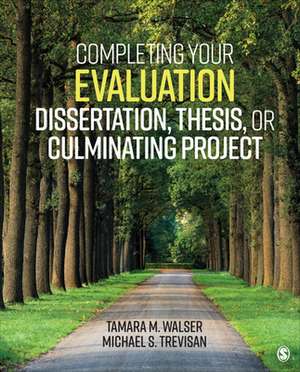Completing Your Evaluation Dissertation, Thesis, or Culminating Project
Autor Tamara M. Walser, Michael S. Trevisanen Limba Engleză Paperback – 24 noi 2020
Preț: 392.70 lei
Preț vechi: 503.46 lei
-22% Nou
75.15€ • 77.86$ • 62.72£
Carte disponibilă
Livrare economică 28 februarie-14 martie
Livrare express 13-19 februarie pentru 28.07 lei
Specificații
ISBN-10: 154430000X
Pagini: 232
Dimensiuni: 187 x 232 x 16 mm
Greutate: 0.41 kg
Ediția:1
Editura: SAGE Publications
Colecția Sage Publications, Inc
Locul publicării:Thousand Oaks, United States
Recenzii
"A superbly written and important treatise that fills a wide gap."
“This is an excellent guide for students undertaking an evaluation capstone project.”
I feel like I have co-teaching partners in the classroom using this text. This is a diverse resource to be used in a classroom setting or for individualized academic research advising for culminating projects.”
“This text is a ‘must-have’ for the student who is conducting an evaluation dissertation study. It contains the essentials for developing a research rationale using the Program Evaluation Standards. It also combines the practical points of conducting a study with the academic requirements of completing a dissertation.”
Cuprins
Acknowledgments
About the Authors
PART 1: Essentials for Your Journey
Chapter 1 • The Evaluation Capstone
Guiding Questions
Chapter Overview
What Is Evaluation?
What Is an Evaluation Capstone?
Chapter Summary
Chapter 2 • Working Productively With Your Committee
Guiding Questions
Chapter Overview
The Evaluation Capstone as a Process and a Product
Nontechnical Skills in Evaluation Education and Practice
Important Nontechnical Skills for Evaluation Capstones
Choosing a Capstone Chair and Committee Members
Communicating With Your Capstone Chair and Committee
Chapter Summary
PART 2: Navigating the Six Fundamentals of Evaluation Practice
Chapter 3 • Quality: Addressing Professional Evaluation Standards and Guidelines
Guiding Questions
Chapter Overview
What Are the Program Evaluation Standards?
Culturally Responsive Evaluation Practice
Evaluator Competencies
Other Guidance for Evaluation Practice
Meta-Evaluation of Your Evaluation Capstone
Chapter Summary
Chapter 4 • Stakeholders: Working With an Evaluation Client and Other Program Stakeholders
Guiding Questions
Chapter Overview
Who Are Program Stakeholders?
Developing a Stakeholder Engagement Plan and Log
Elements of Effective Stakeholder Interactions
Chapter Summary
Chapter 5 • Understanding: Developing Understanding of a Program
Guiding Questions
Chapter Overview
Why Does the Program Exist?
What Is the Program, and How Is It Intended to Work?
In What Context Does the Program Operate?
Conducting a Review of the Literature for Your Evaluation Capstone
Chapter Summary
Chapter 6 • Values: Engaging Values Through Evaluation Purpose, Questions, and Criteria
Guiding Questions
Chapter Overview
Engaging Values
Evaluation Purpose Statement
Evaluation Questions
Evaluation Criteria
Remaining Flexible
Chapter Summary
Chapter 7 • Approaches: Applying Evaluation Approaches
Guiding Questions
Chapter Overview
Evaluation Theories, Models, and Approaches
Taxonomies of Evaluation Approaches
Choosing an Evaluation Approach
The Relationship Between Evaluation Approach and Design
Developing the Evaluation Design
A Note About Validity and Trustworthiness for Evaluation
Chapter Summary
Chapter 8 • Use: Maximizing Evaluation Use
Guiding Questions
Chapter Overview
Laying the Groundwork for Evaluation Use
Additional Ideas About Increasing Evaluation Use
Types of Evaluation Use
Developing Evaluation Findings and Recommendations
Developing an Evaluation Communication Plan
Evaluation Capstone Reporting Formats
Chapter Summary
References
Index
Notă biografică
Dr. Tamara Walser has worked in the evaluation field for more than 25 years. She is a professor in the department of Educational Leadership at the University of North Carolina Wilmington where she coordinates the Evaluation and Organizational Learning M.S. degree and Evaluation post-baccalaureate certificate program; she teaches courses in evaluation, inquiry methods, and academic writing. Dr. Walser previously worked as an evaluator in non-profit and for-profit organizations. She has served as Principal Investigator, Co-Principal Investigator, Project Manager, Lead Evaluator, and as an Advisory Group member on numerous grants and contracts focused on evaluation; and has presented research and training on evaluation nationally and internationally. She co-authored the book, Evaluability Assessment: Improving Evaluation Quality and Use, published in 2015. Dr. Walser obtained a Ph.D. in Research and Evaluation and a M.S. in Instructional Design and Development from Utah State University; she earned a B.A. in French from the University of North Carolina at Charlotte and began her professional career as a French teacher.
